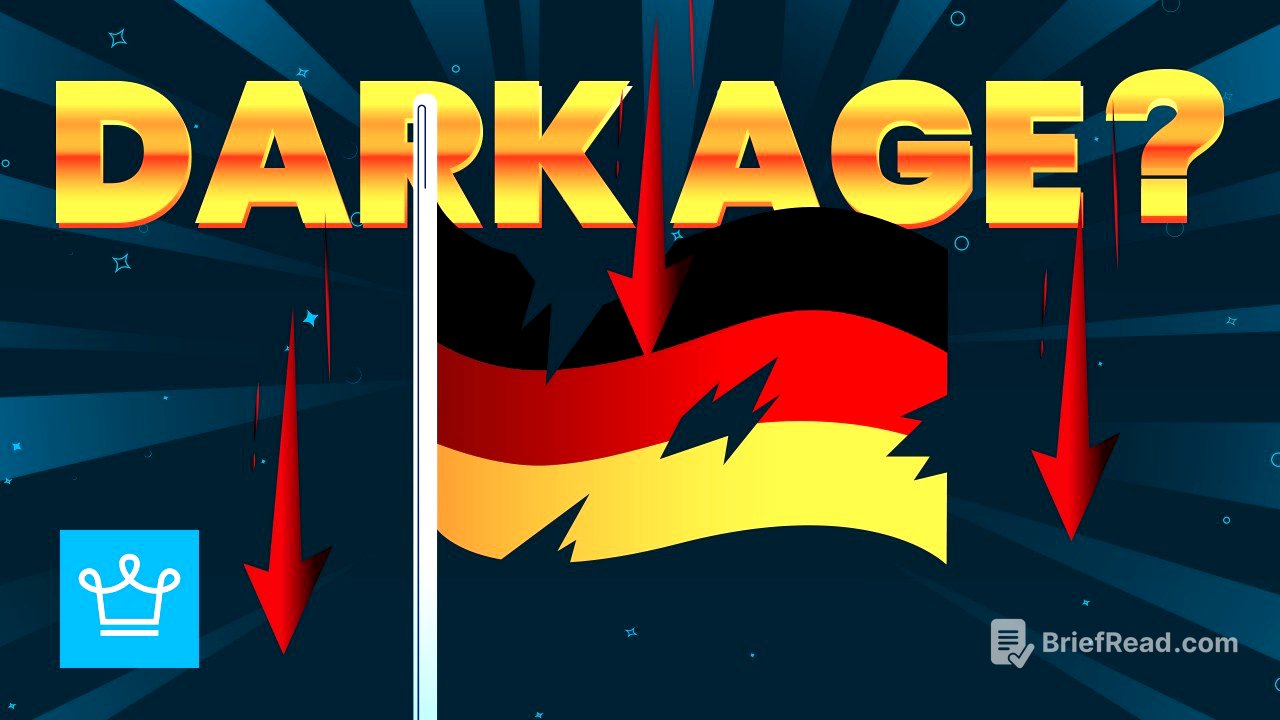TLDR;
The video discusses Germany's economic decline from its "second golden age" to its current struggles as the worst-performing economy among G7 countries. It explores the factors contributing to this decline, including decreased demand from China, the Volkswagen "Dieselgate" scandal, the impact of the COVID-19 pandemic on supply chains, and the energy crisis resulting from cutting ties with Russia. The video also examines Germany's attempts to revitalize its economy through Agenda 2030, which includes lowering corporate tax rates, reducing regulations, incentivizing pensioners to work, and increasing investment in green energy and infrastructure.
- Germany's economy was once strong due to its focus on high-quality manufacturing and exports.
- Factors such as decreased demand from China, the Volkswagen scandal, and the energy crisis have contributed to its decline.
- Germany is now trying to revitalize its economy through Agenda 2030, which includes tax cuts, deregulation, and increased investment.
Intro [0:00]
Germany's economy has rapidly declined from a "second golden age" to the worst-performing among G7 countries. Despite being a top exporter of advanced machinery and home to brands like BMW and Mercedes-Benz, Germany faces significant economic challenges. The video explores the reasons behind this decline and its potential global impact.
The Second Golden Age [1:03]
Germany's economic strength was built on its reputation for precision, perfectionism, and long-term thinking. The country focused on producing high-quality goods, particularly in machinery, automotive, chemicals, and pharmaceuticals, which became essential to various industries worldwide. This focus allowed Germany to dominate key markets and experience steady economic growth, even rebounding quickly after the 2008 financial crisis. The government had a budget surplus, and exports skyrocketed due to a weaker euro. Labor reforms in the early 2000s, combined with booming trade with China and the expansion of the European Union, further strengthened Germany's economy.
The Decline Begins [5:21]
The decline began gradually with China, a major customer, reducing spending due to Trump-era tariffs in 2018. The Volkswagen "Dieselgate" scandal further damaged Germany's reputation. Volkswagen, a key player in the automotive industry, was found to have cheated on carbon emissions tests by installing defeat devices in 11 million diesel cars worldwide. This scandal led to billions in fines, settlements, and recalls, as well as a loss of trust in the brand and highlighted Germany's lagging behind in green innovation and electric vehicles.
It Gets Worse [9:26]
Entering 2020 with a fragile economy, Germany faced additional challenges due to the COVID-19 pandemic, which exposed weaknesses in its global supply chains. The country's lean, just-in-time manufacturing model, which relied on minimal inventory and precise shipping schedules, collapsed due to disruptions in supply chains from China and Southeast Asia. In 2022, cutting ties with Russia triggered a major economic shock, as Germany's energy model depended on cheap Russian gas. The halt of the Nordstream 2 pipeline and the subsequent sabotage of Nordstream 1 led to high energy prices, forcing the government to spend billions on subsidies. Companies like BASF paused production in Germany and invested in China, where energy was more reliable.
Where We Are Right Now? [13:29]
While the cost of living crisis affects much of the Western world, Germany's situation is unique. The traits that once made Germany strong, such as its focus on specific industries and reliance on cheap energy, have become liabilities. The country lacks a strong finance or tech industry and has lost its competitive edge due to high energy costs and a damaged reputation. Aging infrastructure, poor broadband coverage, low birth rates, and strict regulations further exacerbate the problem.
Where to From Here? [16:41]
Germany is attempting to revitalize its economy through Agenda 2030, which aims to lower the corporate tax rate from 40% to 25% and reduce regulations. The plan also includes streamlining approval processes for building projects and incentivizing pensioners and retirees to continue working. To address the need for investment in other sectors, Germany has created a new 500 billion euro fund and amended its debt break to allow for increased spending on defense, infrastructure, and energy. These changes represent a significant shift in Germany's economic policy, moving from a focus on stability to a more flexible and risk-tolerant approach.









